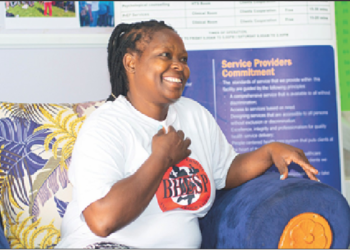NAIROBI, KENYA – Sally* was a third-year student at the University of Nairobi when she landed an internship in the administration office.
“I met the officer in charge of the interns … he asked me to fill in a form with my details and report to the office the next week for work. I was so happy because I knew very well that my courage and confidence had landed me the job,” Sally, 24, recalls.
Although she was given no written offer, she didn’t mind. She had been told she would be paid $10 a week – good money considering she had nothing to do during the long holiday.
Two weeks after she reported for work, the officer who offered her the job asked to meet her to discuss a contract. She agreed to a meeting after work.
“I walked into his office that evening and found him waiting. The first thing he did was to lock the door and keep the key,” she says. She thought his actions were strange, but didn’t ask why.
“After chatting for a short time about work, he walked to me and said, ‘So don’t you think it’s now time for you to return the favor?’ As I tried to understand what exactly he meant, he was already undressing me.”
He raped her. She had nowhere to run. All she could do was cry, but that yielded no help.
After he was done, the man took out his phone and called a taxi to take her home. Before he left, he warned her that she could face consequences or even be expelled from campus if she dared to tell anyone about the incident. He handed her $10 for the taxi fare, but she refused the money. Then he told her she still had her job for the next three months, if she wished to continue.
Confused and not knowing what to do next, Sally took a bus home, sobbing throughout the journey. She had a shower and cried herself to sleep.
For a full year, Sally stayed silent. It wasn’t until she was attending a session on reproductive health that she opened up to the university women’s leader. But it was too late for any action to be taken, since she had not recorded a statement at the time of the rape.
“Getting over the whole ordeal and trusting anyone, even my boyfriend, has become a problem, but through counseling I’m getting, I am better than before,” Sally says.
A Widespread Phenomenon
We usually hear about sexual assault on campus in the context of universities in the United States. But the problem is also prevalent in developing countries, like Kenya.
In recent years, a string of high-profile assaults on women students in the country have caused activists to raise the alarm about sexual violence at universities.
In 2015, a female student at Moi University was raped and killed on campus. In October this year, students at the same university’s Eldoret campus staged a protest after a security guard was accused of raping a first-year student. Also in October, at the University of Nairobi, officers from the General Service Unit, a paramilitary wing of the police, were accused of sexually assaulting female students when police stormed the university during election-related protests.
A 2016 study found that more than 50 percent of students at the University of Eldoret had been sexually harassed in some way.
Mary Ojwang, chair of the Women Student Welfare Association of the University of Nairobi, says although most sexual assault cases are reported by the students, the biggest challenge is lack of action by the security officers and administration.
“When we receive reports on these cases, we report them first to the university security office for action,” says Ojwang. “But instead of acting and taking the disciplinary measures as required, all they do is to summon and warn the accused person.
“So we are left with no option but to take the matter to the police on our own.”
Many cases go unreported because the women fear victimization, she adds.
Ojwang says that since January this year, eight cases have been passed to the police for investigation, and three people have been arrested for sexually assaulting students. Most assaults are committed by male students.
Josephine Mong’are, chair of the Federation of Women Lawyers – a women’s rights organization in Kenya – says rape cases are criminal matters, and action must always be taken against perpetrators.
“Once we are notified of the cases, we pick them up, assist the raped student with a medical test and, if the case was not reported, they report to the police for investigation and prosecution thereafter,” Mong’are says.
The federation is currently working with the Women Student Welfare Association of the University of Nairobi on prosecuting the October assaults.
“We are informed that female students were raped and sexually assaulted by the security forces and once we have the evidence and testimonies from those affected, we shall then ask the director of public prosecutions and the inspector general of the police to ensure immediate action is taken against the perpetrators,” Mong’are says.
Proper Reporting Channels
Maurice Oduor, a lecturer at Moi University school of law, says sexual assaults on female students happen because Kenyan institutions do not have proper reporting systems.
“If there are proper reporting channels for students at the universities, people will be afraid to commit this offense,” says Oduor, adding that the learning establishments should strengthen their support systems to help curb cases of sexual assault.
Kenyatta University has plans to do so. Florence Nyamu, director of the university’s Centre for Gender Equity and Empowerment, says they are developing a policy to address sexual harassment and a system to handle complaints.
“This mechanism will give a clear definition on sexual harassment so that students, teaching staff and social workers know the consequences of sexual harassment cases and the clear channel for reporting these cases,” Nyamu says.
“The mechanisms will handle sexual assault cases and provide for students to seek help in confidence.”
*Name changed to preserve anonymity.
This is part of a series of articles to mark the 16 Days of Activism Against Gender-Based Violence campaign.














